(完整版)外研版英语初一下册Module4Unit2.学案
- 格式:doc
- 大小:51.02 KB
- 文档页数:3
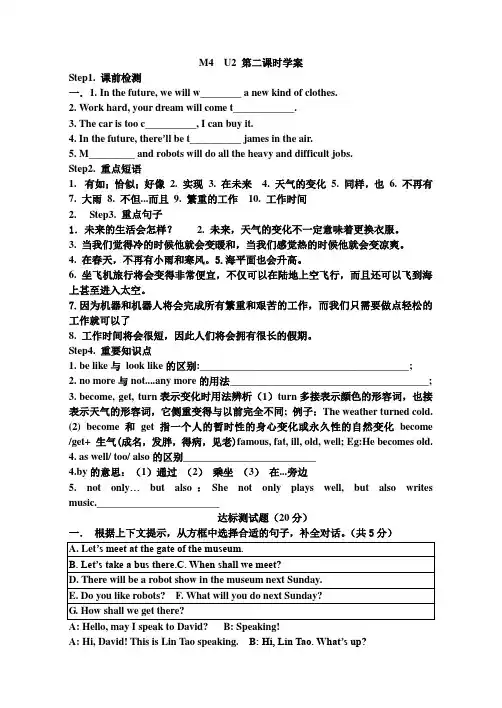
M4 U2 第二课时学案Step1. 课前检测一.1. In the future, we will w________ a new kind of clothes.2. Work hard, your dream will come t____________.3. The car is too c__________, I can buy it.4. In the future, there’ll be t__________ james in the air.5. M_________ and robots will do all the heavy and difficult jobs.Step2. 重点短语1.有如;恰似;好像2. 实现3. 在未来4. 天气的变化5. 同样,也6. 不再有7. 大雨8. 不但...而且9. 繁重的工作10. 工作时间2.Step3. 重点句子1.未来的生活会怎样? 2. 未来,天气的变化不一定意味着更换衣服。
3. 当我们觉得冷的时候他就会变暖和,当我们感觉热的时候他就会变凉爽。
4. 在春天,不再有小雨和寒风。
5.海平面也会升高。
6. 坐飞机旅行将会变得非常便宜,不仅可以在陆地上空飞行,而且还可以飞到海上甚至进入太空。
7.因为机器和机器人将会完成所有繁重和艰苦的工作,而我们只需要做点轻松的工作就可以了8. 工作时间将会很短,因此人们将会拥有很长的假期。
Step4. 重要知识点1.be like与look like的区别:_________________________________________;2.no more与not....any more的用法_______________________________________;3.become, get, turn表示变化时用法辨析(1)turn多接表示颜色的形容词,也接表示天气的形容词,它侧重变得与以前完全不同; 例子:The weather turned cold.(2) become 和get 指一个人的暂时性的身心变化或永久性的自然变化become /get+ 生气(成名,发胖,得病,见老)famous, fat, ill, old, well; Eg:He becomes old.4. as well/ too/ also的区别__________________________4.by的意思:(1)通过(2)乘坐(3)在...旁边5. not only…but also:She not only plays well, but also writes music.________________________达标测试题(20分)A: Hello, may I speak to David? B: Speaking!A: Hi, David! This is Lin Tao speaking. B: Hi, Lin Tao. What’s up?A: (1)______________ B: Nothing. Do you have any ideas?A: Shall we go to the museum? (2) _____ B: A robot show? Good idea! (3) _____ A: By bus or by bike? B: Let’s go by bike. (4) ___________A: What about a quarter past ten? B: OK! Where shall we meet?A: (5) ___________ B: All right. See you then.二.单项选择题(5分)1.—_______he like his father or his mother?—He looks like his father. A. Does B. Do C. Is D. Are2. I usually go to work ______ bike but today I go to work ______ a bus.A. by, byB. in, inC. by, onD. on, by3. — Will there be schools in the future?—_______ But they will be quite different from ones today.A. Yes, there is.B. Yes, there will.C. No, there won’t.D. No, there isn’t.4. What do you think the weather _______ in 100 years?A. will likeB.likeC. likesD. will be like5. The radio says that there will be ______ winds and ______ rain next week.A. strong; heavyB. small; heavyC. heavy; largeD. strong; large 三.阅读理解。
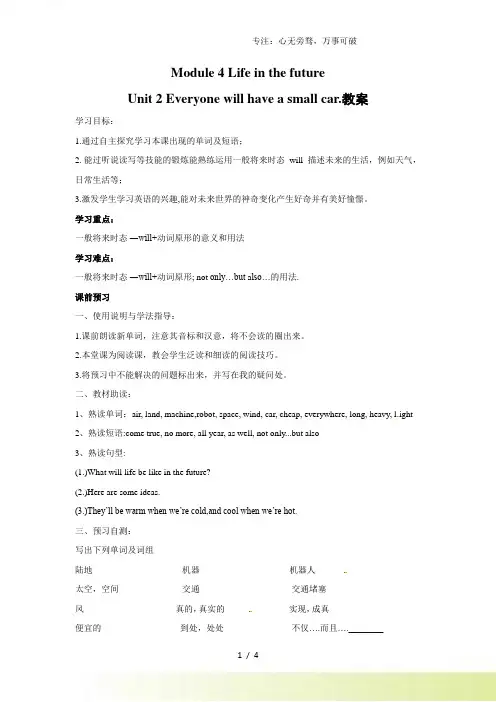
Module 4 Life in the futureUnit 2 Everyone will have a small car.教案学习目标:1.通过自主探究学习本课出现的单词及短语;2. 能过听说读写等技能的锻炼能熟练运用一般将来时态will描述未来的生活,例如天气,日常生活等;3.激发学生学习英语的兴趣,能对未来世界的神奇变化产生好奇并有美好憧憬。
学习重点:一般将来时态―will+动词原形的意义和用法学习难点:一般将来时态―will+动词原形; not only…but a lso…的用法.课前预习一、使用说明与学法指导:1.课前朗读新单词,注意其音标和汉意,将不会读的圈出来。
2.本堂课为阅读课,教会学生泛读和细读的阅读技巧。
3.将预习中不能解决的问题标出来,并写在我的疑问处。
二、教材助读:1、熟读单词:air, land, machine,robot, space, wind, car, cheap, everywhere, long, heavy, l ight2、熟读短语:come true, no more, all year, as well, not only...but also3、熟读句型:(1.)What will life be like in the future?(2.)Here are some ideas.(3.)They’ll be warm when we’re cold,and cool when we’re hot.三、预习自测:写出下列单词及词组陆地_____________ 机器 _____________ 机器人 _____________太空,空间 ________ 交通___________ 交通堵塞 _____________风 _____________ 真的,真实的 ______ 实现,成真 _____________ 便宜的 _____________ 到处,处处_____________ 不仅….而且….________繁重的,沉的_________ 轻的,轻松的__________ 工作的_________短的,短暂的_________ 升起,上升___________Keys:land machine robot space traffic traffic jam wind true come true cheap everywhere not only...but also heavy light job short raise四、我的疑惑:____________________________________________________课内探究一、情景导入:free talk. Look at the pictures on PPT and talk about them.二、学始于疑:ask students to talk about the life i n the future三、质疑探究1.Feedback on the preview讨论解决预习中存在的问题(师生互问探讨)。
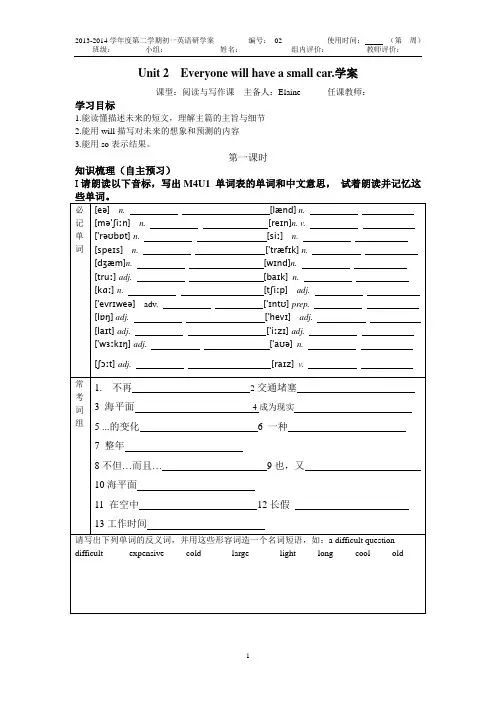
Unit 2 Everyone will have a small car.学案课型:阅读与写作课主备人:Elaine 任课教师:学习目标1.能读懂描述未来的短文,理解主篇的主旨与细节2.能用will描写对未来的想象和预测的内容3.能用so表示结果。
第一课时知识梳理(自主预习)I请朗读以下音标,写出M4U1 单词表的单词和中文意思,试着朗读并记忆这ⅡTeaching Steps (走进课堂)1) Choose the correct answers(选出正确答案)①Why will flying be very cheap?A. There will be more cars.B. Fuel(燃料)will be very cheap.C. Everyone will have a small planes.D. Planes will be very large.②_____ will do heavy or difficult jobs in the future.A. People B. Robots C. Machines D Robots and machines③The summer will be ________ and the spring will be _______.A. warm, coolB. hot, coldC. cool, warmD. hot, warmTask 5 Writing 写作随着科技的发展,越来越多的机器人被制造出来,除了大量应用于工业外,机器人也走进人们的生活,几乎每个家庭有一个机器人。
请以Robots at home in the future为题,写一篇短文,谈谈机器人在未来家庭中的应用情况(比如:打扫卫生、洗衣、做饭、照顾老人和小孩等)。
要求:1、条理清楚、意思连贯、语句通顺、标点正确。
2、50-60词。
Robots in the futureIn the future, there will be a robot in everyone’s home._______________________________________________________________________________ _______________________________________________________________________________ _______________________________________________________________________________ _______________________________________________________________________________ _______________________________________________________________________________ _______________________________________________________________________________ _______________________________________________________________________________ _______________________________________________________________________________ ⅢTest after class(课后检测).1)根据汉语提示完成下列句子,每空一词。
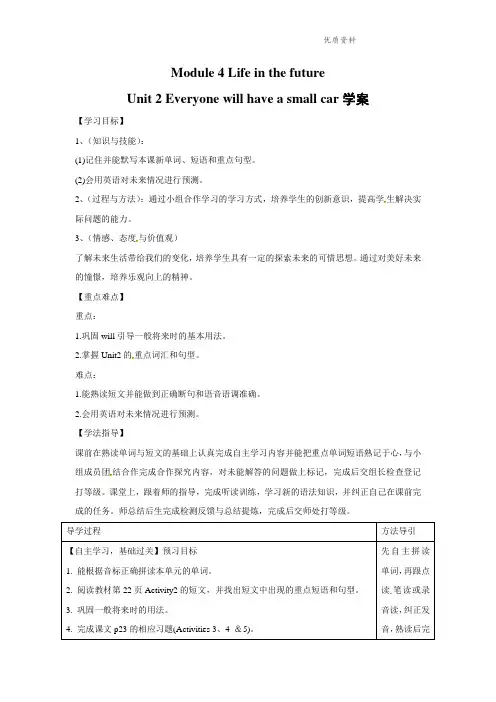
Module 4 Life in the futureUnit 2 Everyone will have a small car学案【学习目标】1、(知识与技能):(1)记住并能默写本课新单词、短语和重点句型。
(2)会用英语对未来情况进行预测。
2、(过程与方法):通过小组合作学习的学习方式,培养学生的创新意识,提高学生解决实际问题的能力。
3、(情感、态度与价值观)了解未来生活带给我们的变化,培养学生具有一定的探索未来的可惜思想。
通过对美好未来的憧憬,培养乐观向上的精神。
【重点难点】重点:1.巩固will引导一般将来时的基本用法。
2.掌握Unit2的重点词汇和句型。
难点:1.能熟读短文并能做到正确断句和语音语调准确。
2.会用英语对未来情况进行预测。
【学法指导】课前在熟读单词与短文的基础上认真完成自主学习内容并能把重点单词短语熟记于心,与小组成员团结合作完成合作探究内容,对未能解答的问题做上标记,完成后交组长检查登记打等级。
课堂上,跟着师的指导,完成听读训练,学习新的语法知识,并纠正自己在课前完成的任务。
师总结后生完成检测反馈与总结提炼,完成后交师处打等级。
导学过程方法导引【自主学习,基础过关】预习目标1. 能根据音标正确拼读本单元的单词。
2. 阅读教材第22页Activity2的短文,并找出短文中出现的重点短语和句型。
3. 巩固一般将来时的用法。
4. 完成课文p23的相应习题(Activities 3、4 &5)。
先自主拼读单词,再跟点读笔读或录音读,纠正发音,熟读后完Unit 2 ( 10 min )一、单项选择( )1. Planes will be very large, so _________ will be very cheap.A. flyB. flyingC. to flyD. flies( )2. This is ________ interesting book. Do you want to get it ?A. an B .a C. the D. /( )3.We go to school five days _______ week.A. inB. anC. theD. a( )4. ________ books in bed is bad for your eyes.A. ReadB. ReadingC. ReadsD. Read to( )5.The boy often uses his computer ________ his friends emails.A. sendB. sendingC. to sendD. sent二、用所给词的反义词填空1. I think that job is very ________ ( easy ) for him to do.2. Tomorrow my father will be _________ ( busy ), and he doesn’t have work to do.3. The new p encil is ____________ ( long ).4. This new English storybook is very _________( dull ).5. My father thinks fuel will be ___________ ( cheap) in the future.三、根据汉语提示完成句子1. Planes will be ______(很大) , so ________( 坐飞机) will be ________(很舒适).2. It will be hot _________(整年), s o the winter ________________(将会很短).3. Maybe there will be _______________(交通拥堵) in the future.4. Computers will be ____________(很小), so they will be ___________(很轻).5. _________(在春天), the weather is very warm.Keys:一、单项选择1.B2.A3.D4.B5.B二、用所给词的反义词填空1.difficlt2.free3.short4.intersting5.expensive 在自主预习与师的引导与补充后,完成当堂检测,并小组测评,打出分数,评出优胜小组。
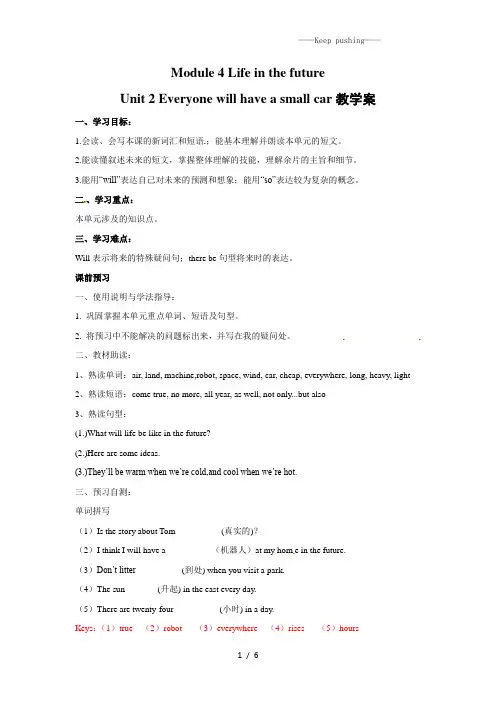
Module 4 Life in the futureUnit 2 Everyone will have a small car教学案一、学习目标:1.会读、会写本课的新词汇和短语;能基本理解并朗读本单元的短文。
2.能读懂叙述未来的短文,掌握整体理解的技能,理解余片的主旨和细节。
3.能用“will”表达自己对未来的预测和想象;能用“so”表达较为复杂的概念。
二、学习重点:本单元涉及的知识点。
三、学习难点:Will表示将来的特殊疑问句;there be句型将来时的表达。
课前预习一、使用说明与学法指导:1. 巩固掌握本单元重点单词、短语及句型。
2. 将预习中不能解决的问题标出来,并写在我的疑问处。
二、教材助读:1、熟读单词:air, land, machine,robot, space, wind, car, cheap, everywhere, long, heavy, light2、熟读短语:come true, no more, all year, as well, not only...but also3、熟读句型:(1.)What will life be like in the future?(2.)Here are some ideas.(3.)They’ll be warm when we’re cold,and cool when we’re hot.三、预习自测:单词拼写(1)Is the story about Tom __________(真实的)?(2)I think I will have a __________(机器人)at my hom e in the future.(3)Don’t litter __________(到处) when you visit a park.(4)The sun _______(升起) in the east every day.(5)There are twenty-four __________(小时) in a day.Keys:(1)true (2)robot (3)everywhere (4)rises (5)hours四、我的疑惑:______________________________________________________课内探究知识点导学1)What will life be like in the future? 未来的生活会怎么样?2)Which ones will come true? 其中那些会变成现实呢?例如:He hopes his dreams come true. 他希望他的梦想成真。
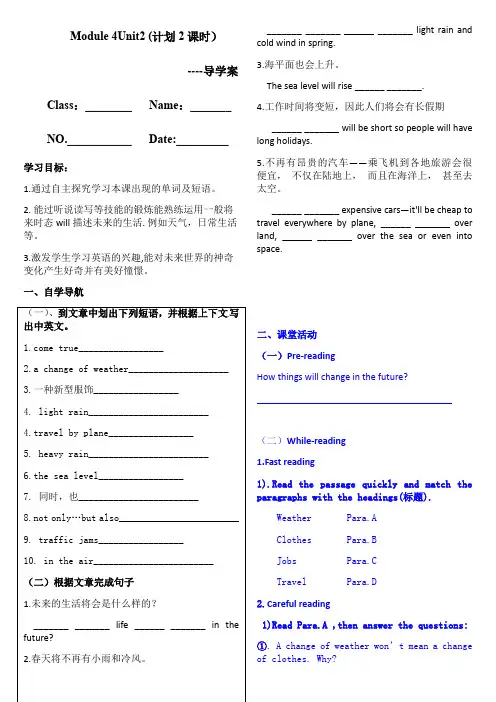
Module 4Unit2 (计划2课时)----导学案Class:________ Name:_______NO.___________ Date:_________学习目标:1.通过自主探究学习本课出现的单词及短语。
2.能过听说读写等技能的锻炼能熟练运用一般将来时态will描述未来的生活.例如天气,日常生活等。
3.激发学生学习英语的兴趣,能对未来世界的神奇变化产生好奇并有美好憧憬。
一、自学导航(一)、到文章中划出下列短语,并根据上下文写出中英文。
e true_________________2.a change of weather____________________3.一种新型服饰_________________4. light rain________________________4.travel by plane_________________5. heavy rain________________________6.the sea level_________________7. 同时,也________________________8.not only…but also________________________9. traffic jams_________________10. in the air________________________(二)根据文章完成句子1.未来的生活将会是什么样的?_______ _______ life ______ _______ in the future?2.春天将不再有小雨和冷风。
_______ _______ ______ _______ light rain and cold wind in spring.3.海平面也会上升。
The sea level will rise ______ _______.4.工作时间将变短,因此人们将会有长假期______ _______ will be short so people will have long holidays.5.不再有昂贵的汽车——乘飞机到各地旅游会很便宜,不仅在陆地上,而且在海洋上,甚至去太空。
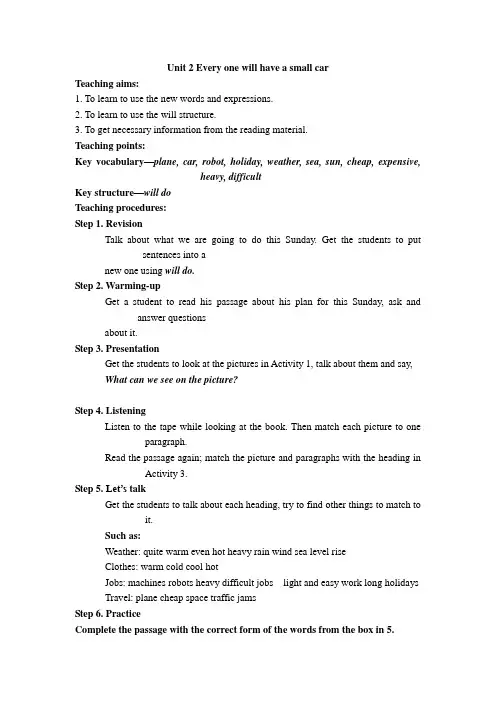
Unit 2 Every one will have a small carTeaching aims:1. To learn to use the new words and expressions.2. To learn to use the will structure.3. To get necessary information from the reading material.Teaching points:Key vocabulary—plane, car, robot, holiday, weather, sea, sun, cheap, expensive,heavy, difficultKey structure—will doTeaching procedures:Step 1. RevisionTalk about what we are going to do this Sunday. Get the students to put sentences into anew one using will do.Step 2. Warming-upGet a student to read his passage about his plan for this Sunday, ask and answer questionsabout it.Step 3. PresentationGet the students to look at the pictures in Activity 1, talk about them and say,What can we see on the picture?Step 4. ListeningListen to the tape while looking at the book. Then match each picture to one paragraph.Read the passage again; match the picture and paragraphs with the heading in Activity 3.Step 5. Let’s talkGet the students to talk about each heading, try to find other things to match to it.Such as:Weather: quite warm even hot heavy rain wind sea level riseClothes: warm cold cool hotJobs: machines robots heavy difficult jobs light and easy work long holidays Travel: plane cheap space traffic jamsStep 6. PracticeComplete the passage with the correct form of the words from the box in 5.air cheap everywhere into rise trueWill travel in the future be expensive? No, it’ll be (1) _______. We’ll travel (2)_______ by plane. We’ll be able to (3)_______ over the traffic jams on the land, and we’ll be able to go (4)_______ space. But maybe there’ll be traffic jams in the (5)_______ too. What do you think? Do you think this idea about life in the future will come (6)_______?Answers:Check the answers.cheap everywhere rise into air trueStep 7. PracticeThe teacher says easy; get the students to say hard or difficult. Say big; get the students tosay small.Get the students to match the words in Box 1 with words which mean the opposite in Box2. (Activity 6)Check the answers.Answers:easy --------- difficultexpensive ---------cheaphot ---------coldlarge ---------smalllight ---------heavylong ---------shortwarm ---------coolStep 8. PracticeSay, I buy a cheap coat, but it’s small. Put it as an example.Guide the students to say a sentence like this:I buy an expensive coat, but it’s large.Get the students to make up new sentences, practice in groups. Then share the answers inclass.Step9. Oral workSay, let’s think what we will have in the future.Talk about it in groups, share the answers in class.Choose one or two students to give a report in class.Help the students to give out the right answers.Step 10. Do exercisesFinish off the exercises in Activity 8.Answers:1 Every family will have a plane so it will be cheap to travel everywhere.2 The weather will get hot so the sea level will rise as well.3 Machines and robots will do the heavy and difficult jobs so we’ll only do light andeasy work.Step 11. Homework1. Finish off the Workbook exercise.2. Copy the new words in this unit.。
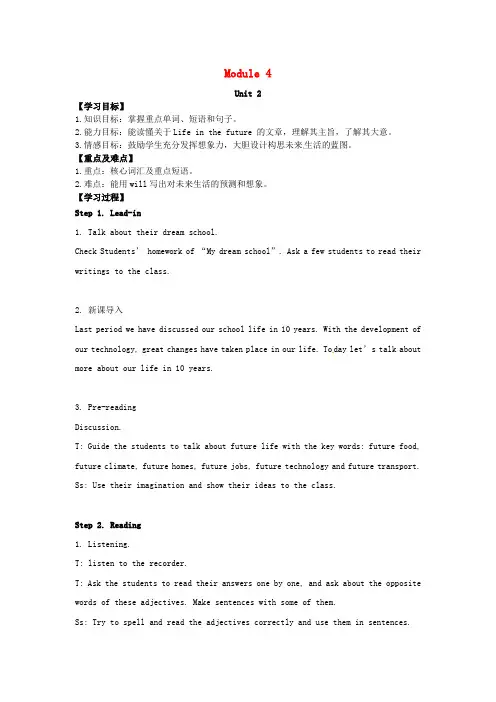
Module 4Unit 2【学习目标】1.知识目标:掌握重点单词、短语和句子。
2.能力目标:能读懂关于Life in the future 的文章,理解其主旨,了解其大意。
3.情感目标:鼓励学生充分发挥想象力,大胆设计构思未来生活的蓝图。
【重点及难点】1.重点:核心词汇及重点短语。
2.难点:能用will写出对未来生活的预测和想象。
【学习过程】Step 1. Lead-in1. Talk about their dream school.Check Students’ homework of “My dream school”. Ask a few students to read their writings to the class.2. 新课导入Last period we have discussed our school life in 10 years. With the development of our technology, great changes have taken place in our life. To day let’s talk ab out more about our life in 10 years.3. Pre-readingDiscussion.T: Guide the students to talk about future life with the key words: future food, future climate, future homes, future jobs, future technology and future transport. Ss: Use their imagination and show their ideas to the class.Step 2. Reading1. Listening.T: listen to the recorder.T: Ask the students to read their answers one by one, and ask about the opposite words of these adjectives. Make sentences with some of them.Ss: Try to spell and read the adjectives correctly and use them in sentences.2. Skimming.T: Make Ss read the passage and match the pictures, the headings with the paragraphs. (Activity 1-3). Ask them to check the true sentences (Activity 4), too.Ss: Read quickly for the main idea of the passage and each paragraph. Finish Activity 4 quickly.3. Scanning.Read and answer the questions.(1) Why won’t a change of weather mean a change of clothes?Because we will wear a new kind of clothes. The clo thes will be warm when we’re cold, and cool when we’re hot.(2) Why will the sea level rise?Because it will be ho t with heavy rain all year.(3) Why won’t they travel by bus or bike any more?Because every family will have a small plane.(4) Why will there be traffic jams in the air?Because we’ll travel everywhere by plane.(5) Why will no one do heavy work?Because machines will do all the heavy and difficult jobs.4. RetellingTeacher writes some key words on the blackboard, and students try to retell the passage according to these key words, one paragraph by one paragraph.Step 3. Consolidation and Extension1. DiscussionRead the exam ple sentences, and help them to see that “so” relate the cause to the effect to become a single sentence with two clauses.e.g. Planes will be very large. Flying will be very cheap.----Planes will be very large so flying will be very cheap.(1)It will probably be hot all year so the winter……(2)We’ll use the sun to heat our homes so ……(3)People will work three days a week so ……2. Homework(1)Try to write a short passage what your family w ill be like in the future.(2)Write about life in the future, including food, climate, technology and homes.达标测试一、用所给词的适当形式填空1. What are your parents’ ______ (job)?2. There’s no ______ (rain) tod ay.3. Her father ________ (study) English in America now.4. Tony’s sister _______________ (work) in that hospital next year.5. —What will the weath er be like tomorrow?—It will be _______ (wind).二、单项选择1. Planes will be very large, so ____ will be very cheap.A. flyB. to flyC. flyingD. flies2. This is ____ interesting book. Do you want to get it?A. anB. aC. theD. /3. We go to school five days ____ week.A. inB. anC. theD. a4. ____ books in bed is bad for your eyes.A. ReadB. ReadingC. ReadsD. Read to5. The boy often uses his computer ____ his friends emails.A. sendB. sendingC. to sendD. sent三、句型转换1. It’s going to be rainy soon. (改为同义句)It’s going to ________ soon.2. They’ll have long holidays and lots of free time. (改为否定句)They ________ have long holidays ________ lots of free time.3. We’ll use the computer to do many things. (改为同义句)We ________ ________ ________ use the computer to do many things.4. They will study at home. They won’t go to school. (用so合并成一句)___________________________________________________________5. The girl likes playing the piano. And she also likes dancing. (合并为一句) The girl ________ _______ likes playing the piano ________ ________ likes dancing.参考答案一、1. jobs2. rain3. is studying4. is going to/will work5. windy二、1.C2. A3. D4. B5. C三、1.rain2. won’t; or3. are going to4. They will study at home so they won’t go to school.5. not only; but also。
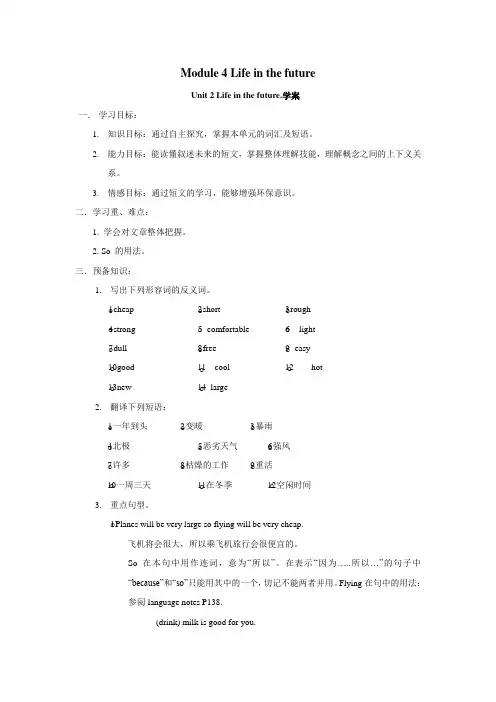
Module 4 Life in the futureUnit 2 Life in the future.学案一.学习目标:1.知识目标:通过自主探究,掌握本单元的词汇及短语。
2.能力目标:能读懂叙述未来的短文,掌握整体理解技能,理解概念之间的上下义关系。
3.情感目标:通过短文的学习,能够增强环保意识。
二.学习重、难点:1. 学会对文章整体把握。
2. So 的用法。
三.预备知识:1.写出下列形容词的反义词。
○1cheap-- ○2short- ○3rough-○4strong- ○5comfortable- ○6light-○7dull- ○8free- ○9easy-○10good- ○11 cool- ○12 hot-○13new- ○14 large-2.翻译下列短语:○1一年到头_______ ○2变暖________ ○3暴雨________○4北极_________ ○5恶劣天气______ ○6强风_______○7许多_______ ○8枯燥的工作____ ○9重活______○10一周三天_____ ○11在冬季______ ○12空闲时间____3.重点句型。
○1Planes will be very large so flying will be very cheap.飞机将会很大,所以乘飞机旅行会很便宜的。
So 在本句中用作连词,意为“所以”。
在表示“因为…..所以…”的句子中“because”和“so”只能用其中的一个,切记不能两者并用。
Flying在句中的用法:参阅language notes P138.______ (drink) milk is good for you.______(walk) and ________ (swim) are good exercises.用so 连接句子:Activity8.○2We will use the sun to heat our homes.我们将利用太阳能为住宅供暖。
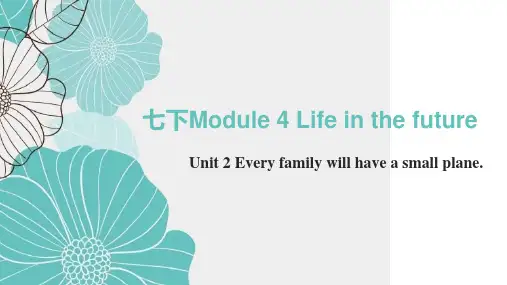
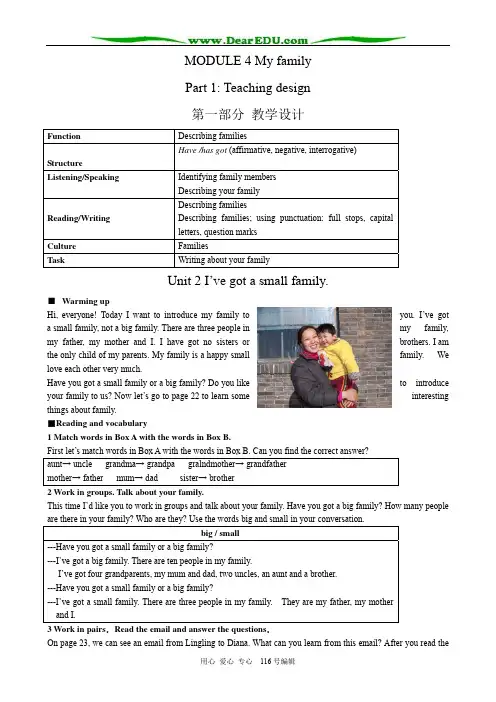
MODULE 4 My familyPart 1: Teaching design第一部分教学设计Function Describing familiesStructureHave /has got (affirmative, negative, interrogative)Listening/Speaking Identifying family membersDescribing your familyReading/Writing Describing familiesDescribing families; using punctuation: full stops, capital letters, question marksCulture FamiliesTask Writing about your familyUnit 2 I’ve got a small family.■ Warming upHi, everyone! Today I want to introduce my family to you. I’ve got a small family, not a big family. There are three people in my family,my father, my mother and I. I have got no sisters or brothers. I amthe only child of my parents. My family is a happy small family. We love each other very much.Have you got a small family or a big family? Do you like to introduceyour family to us? Now let’s go to page 22 to learn some interesting things about family.■Reading and vocabulary1 Match words in Box A with the words in Box B.First let’s match words in Box A with the words in Box B. Can you find the correct answer?aunt→uncle grandma→grandpa gralndmother→grandfathermother→ father mum→dad sister→ brother2 Work in groups. Talk about your family.This time I’d like you to work in groups and talk about your family. Have you got a big family? How many people are there in your family? Who are they? Use the words big and small in your conversation.big / small---Have you got a small family or a big family?---I’ve got a big family. There are ten people in my family.I’ve got four grandparents, my mum and dad, two uncles, an aunt and a brother.---Have you got a small family or a big family?---I’ve got a small family. There are three people in my family. They are my father, my motherand I.3 Work in pairs.Read the email and answer the questions.On page 23, we can see an email from Lingling to Diana. What can you learn from this email? After you read theemail, please answer the four questions below.How many people are there in Betty’s family? →There are five people in Betty’s family.Is Betty’s family small?→No, It isn’t. It’s a big family.Has Betty got any brothers or sisters?→Yes, she has. She has got two brothers.How many people are there in Tony’s family?→There are ten people in Tony’s family.Let’s read the email. While reading try to cut (断句)/ the sentences into parts, blacken(涂黑) the predicates, shade(加影)the connectives and underline(划线)the expressions.Dear Diana,Thank you for your email.There are five people in my family ---my mother/ and father /and my two grandparents. I’ve gotan aunt. I haven't got any uncles, or brothers /and sisters.I’ve got an American friend. Her name’s Betty. She’s in China /with her mum/ and dad. She’s gottwo brothers. She’s got two grandparents/ and two aunts /in America.I’ve got an English friend. His name’s Tony. He’s got a big family. He’s got four grandparents, hismum /and dad, two uncles, an aunt/ and a sister.How many people are there in your family, Diana?LinglingNow write all the expressions in your Expression Book.thank you for…, there are…, in my family, I’ve got…, I haven't got any…, an American friend, tobe in China with sb., in America, an English friend have got a big family have got four grandparents, how many…are there in your family?Write as they do. (仿写)Dear Huo Guang,Thank you for your email.There are three people in my family ---my mother, my father and I. I’ve got two aunts. I haven'tgot any uncles, or brothers and sisters.I’ve got a Japanese friend. Her name’s Zuo Ni. She’s in China with her dad. She’s got one brother.She’s got two grandparents in America.I’ve got an American friend. His name’s Smith. He’s got a small family, too.How many people are there in your family, Huo Guang?Liu LiqingRead the email once again. This time pay attention to its meaning. Try to understand the passage yourself.■Writing4 Look at this passage. Underline the capital letters,full stops and question marks.In our writing, it is important to know the use of capital letters, full stops, question marks and other punctuations. Now please underline these things in the passage.capital letter full stop question markLingling has got a small family. How many people are there in her family? There arefive---Lingling, her two parents and her two grandparents. She's got an aunt. She hasn’t got anyuncles. She hasn't got any brothers or sisters.5 Put capital letters, full stops, and question marks into this passage.Do you know when to use the capital letters? Do you know the difference between full stops and question marks? Please put these things into the passage below.Write as they do.(仿写)Ma Xiao's Chinese and he’s got a small family. How many people are there in his family? He hasn’t got any brother and sister in his family. But he has two brothers. They are his uncle’s sons. They are older than him. They are in Hubei.。
Unit 2 Every family will have a small plane.一.教学内容分析本模块以未来的教室及学习为切入点,谈论将来我们生活的各个方面,学生较为有兴趣,便于展开活动。
Unit 2的主要内容是一篇有关描述未来生活的阅读文章及相关习题。
二.学生情况分析本模块以学生心目中的未来为话题,这与学生的现实生活密切相关,涉及的语法是一般将来时will加Be动词加形容词的用法以及有关将来时的肯定否定句式。
三.教学目标1.以谈论将来生活为中心,介绍并询问有关将来生活的信息。
2.能运用一般将来时中出现的形容词的句式四.教学重点和难点1.词汇的正确运用。
2.一般将来时will的陈述句,否定句,一般疑问句及回答五.教学策略任务型教学,自主学习,合作学习六.教学过程Task 1: 见课本P22 ②Task 2: 见课本P23 ③Task 3: 见课本P23 ④Task 4: Read and answer the questions.1. Why won’t a change of weather mean a change of clothes?2.Why will the sea level rise?3. Why won’t they travel by bus or bike any more?4. Why will there be traffic jams in the air?5. Why will no one do heavy work?Task 5: Translate the following expressions into English. 1.实现;成真_________2.海平面_____________3.也_________________4.进入太空___________5.交通阻塞___________6.在空中_____________7.不仅……而且…… __________________Task 6: 见课本P23 ⑤Task 7: 见课本P23 ⑥Post-reading:Post-reading:Ⅰ. 用方框中适当的单词完成下列句子。
Module 4 Life in the future Unit 2 Everyone will have a small plane.Teaching aims:To get necessary information from the reading materialKey points:Key words: car, farm, holiday, plane, sea, sun, efortableKey structures: will + V.原形Teaching procedures:Step 1: Warming-upGet the students to talk about the schools in the future.Step 2: Presentation:1. show the question: What will our life be like in the future? Then tell the students that today we will talk about the life in the future from five aspects.2. Teach the five aspects: climate, homes, jobs, technology, transport3. Show the five pictures to the students, tell them that each picture refers to one aspect. Have the student match the pictures with the aspects.4. Talk about the five picture.5. Teach the new words of this unit.Step 3: Reading1. Read the passage and match the pictures and paragraphs with the headings.2. Play the tape, show the two boxes in Activity 4 and have the students match the words in Box 1 with the words in Boents to the students and have the students read the passage again, then check the sentences.Step4: DrillRetell the passageStep 5 DiscussionWork in pairs and discuss the questions in Activity 7.HomeworkExercise books unit2。
Module 4 Life in the future班级_______ 姓名________ 小组_______ 等级______Learning Aims:1.Memorize 25 key words and 10 phrases in M4U2;improve the ability of fast reading and detailed reading.2. Learn the method of describing the future with will by cooperation and discussion.3. Form the active attitude towards to life and make your own plan for the bright future.【使用说明与方法指导】1.运用双色笔,在课本上划出重点单词、短语、句型;并标出自己的疑难点。
2.通过逐层阅读,把握文章大意,获取文章细节信息。
【预习案】I.. 阅读训练:认真预习P22课文---Life in the future.(方法导引:采用扫描式阅读,寻找有用信息,对无关部分可以省略。
)一. Fast-reading(快速浏览课文,不要在难于理解的单词处停顿,重在大意理解, 回答下列问题。
)1.Match the paragraphs with the headings. (把段落A.B.C.D与标题相匹配)1. Para. --- Weather2. Para. ---Clothes 3 .Para. ---Jobs 4. Para. ---Travel2. Check(√) the true sentences.(1) People have to change clothes in hot weather. ( )(2) The weather will be warm in spring. ( )(3) A lot of people will travel by plane so maybe there will be traffic jams in the air. ( )(4) People will have long holidays because machines will do heavy work. ( )二.Careful-reading细节阅读:(认真阅读课文,弄清细节,才能正确获取信息呀!)1. What will clothes be like in thefuture? .2.Why the sea level will rise? .3. Why will there be traffic jams in the air? .4. Who will do heavy and difficult jobs in the future? .II.基础夯实:1. 默读课文M4 Unit2课文一遍,找出下列单词的反义词:easy________expensive________ hot_______ large_______ light_______ long_________warm _______ 2. 找出以下短语, 并在课本中勾划,有选择的标注汉语。
外研版初中七年级下册Module 4 Unit 2 Every family willhave a small plane. 教案I. Teaching Objectives:By the end of this lesson, students will be able to:1. Understand the concept of future transportation and its implications.2. Use future tenses to talk about predictions for future life.3. Use vocabulary related to transportation and travel.4. Describe potential advantages and challenges of owning a small plane.5. Participate in group discussions and roleplays about owning and usinga small plane.6. Write a short paragraph or essay about the benefits and drawbacks of having a small plane.7. Reflect on the impact of technological advancements on personal transportation.II. Key Vocabulary:Verbs related to transportation (fly, travel, soar, land)Nouns related to small planes and travel (aircraft, propeller, runway, destination)Adjectives describing the experience of flying (exciting, convenient, fast, expensive)Phrasal verbs for describing actions related to flying (take off, go through, board, get in)Time expressions for future events (in the future, by 2030, eventually) III. Target Language Structures:Simple future tense (will + verb)Future continuous tense (will be + verb+ing)Second conditional for predictions (If I own a small plane, I might travel more.)Making educated guesses using might (We might need to learn aviation safety rules.)Yes/No questions with the future tense (Will there be traffic jams in the sky?)Tag questions for confirmation (Flying will be convenient, won't it?) IV. Teaching Aids:Multimedia projector for displaying slides and video clips about small planes and future travel.Whiteboard and markers for illustrating key points and grammar rules. Images and realia depicting small planes, airports, and travel destinations.Handouts with sample sentences, discussion questions, and writing prompts.Visual aids such as charts or graphs to illustrate the growth of personal aviation.Audio recordings of flight simulations or interviews with pilots oraviation experts.V. Teaching Procedures:Step 1: Warmup (5 minutes)Begin with an engaging activity like a quick survey on students' experiences with flying or their dreams of owning a small plane. Introduce key vocabulary through a word wall activity where students post words related to small planes and travel.Step 2: Prereading (5 minutes)Show students images or short video clips of small planes and discuss what they see and predict.Review the target language structures, focusing on the simple future tense.Step 3: Whilereading (15 minutes)Provide a reading text that talks about the future of personal transportation, including predictions about owning a small plane. Ask students to read along, identifying key points about the topic.Lead a guided class discussion to ensure prehension and encourage students to share their thoughts on the topic.Step 4: Postreading (15 minutes)In pairs or small groups, students discuss how they think owning a small plane might change their lives using the target language structures. Circulate the classroom to provide feedback and support accurate useof future tenses.Step 5: Speaking Practice (10 minutes)Conduct a roleplay activity where students take turns pretending to be families discussing the pros and cons of owning a small plane.Some pairs can perform their roleplay for the class.Step 6: Writing Task (10 minutes)Assign a writing task where students draft a paragraph or essay describing their opinion on the idea of every family having a small plane, using the target language structures and including specific details. Encourage students to consider both positive and negative aspects of this future possibility.Step 7: Homework & Review (5 minutes)As homework, assign students to create a concept map or a poster showing the benefits and drawbacks of owning a small plane.Review key vocabulary and language structures through a "Future Travel Quiz," where students answer questions about different aspects of owning a small plane.VI. Assessment:Evaluate students based on their participation in discussions, prehension during reading tasks, correct usage of future tenses in speaking practice, and the quality of their written assignments. Assess the ability to make predictions about the future of personaltransportation using the second conditional and other future tenses accurately.。
Unit 2 Everyone will have a small car.学案
课型:阅读与写作课主备人:Elaine 任课教师:
学习目标
1.能读懂描述未来的短文,理解主篇的主旨与细节
2.能用will描写对未来的想象和预测的内容
3.能用so表示结果。
第一课时
知识梳理(自主预习)
I请朗读以下音标,写出M4U1 单词表的单词和中文意思,试着朗读并记忆这
ⅡTeaching Steps (走进课堂)
1) Choose the correct answers(选出正确答案)
①Why will flying be very cheap?
A. There will be more cars.
B. Fuel(燃料)will be very cheap.
C. Everyone will have a small planes.
D. Planes will be very large.
②_____ will do heavy or difficult jobs in the future
.A. People B. Robots C. Machines D Robots and machines
③The summer will be ________ and the spring will be _______.
A. warm, cool
B. hot, cold
C. cool, warm
D. hot, warm
Task 5 Writing 写作
随着科技的发展,越来越多的机器人被制造出来,除了大量应用于工业外,机器人也走进人们的生活,几乎每个家庭有一个机器人。
请以Robots at home in the future为题,写一篇短文,谈谈机器人在未来家庭中的应用情况(比如:打扫卫生、洗衣、做饭、照顾老人和小孩等)。
要求:1、条理清楚、意思连贯、语句通顺、标点正确。
2、50-60词。
Robots in the future
In the future, there will be a robot in everyone’s home.
_______________________________________________________________________________ _______________________________________________________________________________ _______________________________________________________________________________ _______________________________________________________________________________ _______________________________________________________________________________ _______________________________________________________________________________ _______________________________________________________________________________ _______________________________________________________________________________ ⅢTest after class(课后检测).
1)根据汉语提示完成下列句子,每空一词。
1. Betty can sing and play the piano ________ ________ (也).
2. I can see her photos ________ (到处) in her bedroom. .
3. The sun r________ (升起) in the east every day.
4. The weather in Hainan is very warm ________ ________ (全年).
5. Maria is ________ ________ beautiful, ________ ________ (不仅……而且……) kind .
2)用方框中所给单词或短语完成下列小短文。
What will your future life be like? Everyone will have different answers. For me, I hope I will have a (1) ________, and it can play with me. Our cars will be very cheap, but there won’t be (2) ________. One day, we will (3) ________ space to travel. And people will live in the (4) ________ and stay with all kinds of fishes. Of course, our (5) ________ hours won’t be very long.
I’m sure it will (6) ________ one day.
第二课时
1、Step 1突破重难点:一般将来时
1)如果表示未来的事实或对将来的预测等,我们可以用___________来表达。
我们称其为一般将来时。
Will表示的一般将来时__________(有/没有)人称和数的变化。
其否定句式在___________ 后面加________,常简略为_________;
其一般疑问句式是_____ ___ 肯定回答__________否定回答________. 如:We will use computers to learn .我们将利用计算机来学习
否定式:
疑问式:
肯定回答:否定回答:
自主造句:(1)
(2)
2)一般将来时用在there be 句型中就是________________,意思为“将来有”。
其一般疑问句式为___________________,肯定回答__________否定回答________.其否定句式__________________.
将来在那里会有一个学校。
There will be a school over there.
否定式:
疑问式:
肯定回答:否定回答:
自主造句:(1)
(2)
课后看译文诵读:
未来的生活会怎样?将会发生怎样的变化?这里有一些想法。
其中哪些会成现实呢?
未来,天气的变化不一定意味着更换衣服。
我们将会穿一种新型的衣服。
当我们觉得冷的时候它就会变暖和,当我们感觉热的时候它就会变凉爽。
在春天,将不再有小雨和寒风。
天气将变得十分温暖甚至整年都炎热,并伴有强风和暴雨。
海平面也将升高。
我们将不会再公共汽车或骑自行车去旅行。
每个家庭都会有一架小飞机。
不会再有昂贵的汽车了——坐飞机旅行将会变得非常便宜,不仅可以在陆地上空飞行,而且还可以飞到海上甚至进入太空。
也许空中会出现交通堵塞呢。
你喜欢漫长的假期么?那么,你会喜欢未来,因为机器和机器人将会完成所有繁重和艰苦的工作,而我们只需要做点轻松而简单的工作。
工作时间将会很短,因此人们将会拥有很长的假期。